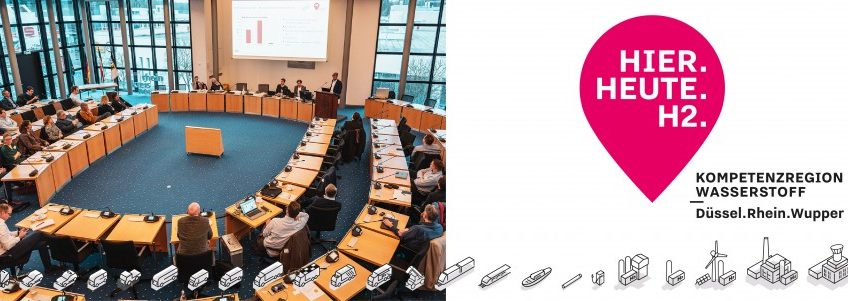United for climate protection and added value: The DÜSSEL.RHEIN.WUPPER region of competence (KOMPETENZREGION WASSERSTOFF Düssel.Rhein.Wupper) is submitting a competition entry to the NRW Ministry of Economic Affairs. The cities of Düsseldorf, Duisburg and Wuppertal, together with the Rhine district of Neuss, Stadtwerke Düsseldorf, Wuppertaler Stadtwerke and Air Liquide, have developed a common vision as to how hydrogen can contribute to climate protection and regional added value in the region. It is the culmination of an almost two-year cooperation project.
As KOMPETENZREGION WASSERSTOFF Düssel.Rhein.Wupper, the consortium aims to advance the use of hydrogen in vehicles, trains and ships, serving as a model for other industrial regions both in Germany and Europe.
The four municipalities and three companies have therefore participated in the competition call “NRW model municipalities/regions for hydrogen mobility” (Modellkommune/-region Wasserstoffmobilität NRW) from the Ministry for Economic Affairs, Innovation, Digitalisation and Energy in the state of North Rhine-Westphalia, and are today submitting their competition entry in the form of a design concept and a film. The concept development was funded by the NRW Ministry of Economic Affairs.
The entire hydrogen value chain was analyzed in the project, which highlighted concrete pathways for the generation, distribution and application of hydrogen in the mobility sector.
The focus of generation is waste-to-energy plants. Approximately half of the electricity they produce can be attributed to the biogenic share of the waste, which is based on renewable raw materials and thus equivalent to renewable energies. Should an electrolyzer be operated using this green electricity, climate-friendly hydrogen is produced in the middle of the city. Hydrogen generation is expected in future to be supplemented by renewable energy systems. Of particular interest here are sun and wind energy systems, whose guaranteed feed-in renumeration scheme under the Renewable Energy Act is expiring after 20 years of operation. Regionally-organised production of hydrogen offers an economic option and future prospects for the continued operation of these facilities.
In the application of hydrogen, it is apparent that primarily commercial vehicles, buses and special-purpose vehicles like for example, waste collection vehicles are suitable for hydrogen propulsion. The logistics area indicates high potential for road, rail and waterways. To facilitate the intermeshing of generation and application, investment is needed in the refuelling infrastructure and hydrogen logistics.


